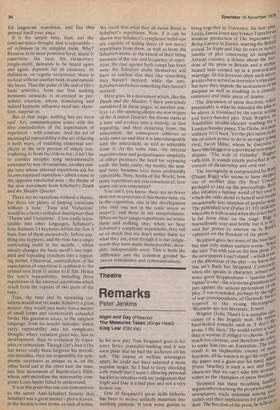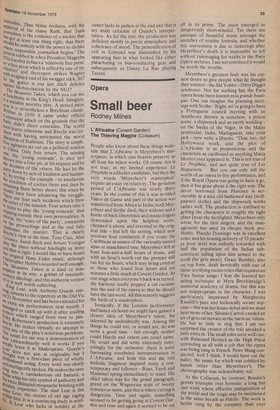Theatre
Remarks
Peter Jenkins
Night and Day (Phoenix) The Measures Taken (Kings Head) King Lear (Old Vic) In his new play Tom Stoppard goes in for some fierce journalist-bashing and it was soon plain that he had the audience on his side. The unions or welfare scroungers apart, he could not have selected a more popular target. So I had to keep checking with myself that I wasn't allowing personal hackles to interfere with my judgement that Night and Day is a bad play and not a very honest one.
One of Stoppard's great skills hitherto has been to weave unlikely materials into dazzling patterns. It took some genius to bring together in Travesties, his best plaY, Lenin, James Joyce and Tristan Tzara for an amateur production of The Importance .0f Being Earnest in Zurich, starring the British consul. In Night and Day he tries to meld a jumble of plot concerning an imaginarY African country, a debate about the free' dom of the press in Britain and a soPins; ticated lady cooped up in a post-Colon marriage. In his previous plays such inenn* gruities have served as invention's stimillail.t but here they impede the seriousness of 1?is purpose as well as resulting in a clurasilY contrived and static piece_ of drama. , The discussion of press freedom,who ,,, presumably is what he intended the plaY,' be about, is trivialised by the exotic setting and heavy-handed plot. Dick Wagner, la Australian trouble-shooter working fat a London Sunday paper, The Globe, is a mos! unlikely NUJ hack. Yet the plot turns on his use of union power to do in an eager Y01114 rival, Jacob Milne, whom he discovers have blackleggcd in a provincial newspaPe' dispute. 'The scab of Grimsby', Wagast.r calls him. It sounds utterly parochial in t' context of dictatorship and civil war. The incongruity is compounded by Ruthd (Diana Rigg) who seems to have stePPed out of another play (by Noel Cowar,h perhaps) to jazz up the proceedings. 10:":„ also inhabits a fantasy world of her own I which she talks aloud to herself and brear: occasionally into snatches of popular snilb: The published text (Faber £1.95) indicate.; when she is with us and when she is not tInt!s, is far from clear on the stage. Rigg marvellously sexy and brittle but it is beehis ond her power to interest us in flu' opinions on the freedom of the press. 5 Stoppard gives her some of the best Pao but that only makes matters worse. Whe„,s she says 'I'm with you on the free press. "c the newspapers I can't stand' —which 1501 ka of the dilemmas of the play — we knoWl”! this isn't Ruth but Stoppard. Convers1 when she speaks in character, armed wit, some good Stoppardisms — 'quietus late d ruptus is one — the wit seems gratuitous the jars against the serious pretensions of.„ht play. I was reminded, perhaps by the si.F;s of war correspondents, of Gertrude Steal,/ reproof to the young HemingWad 'Remarks are not literature, Ernest.' Wagner (John Thaw) is a passable Careis cature of a fire brigade man. He nlie hard-boiled remarks such as 'I don't ,„% prose. I file facts.' He would rather a tel'os than a woman if obliged to choose.r much too obvious, and therefore an e'tsj to make him into an Australian. The to ss result is an implausible enemy Of Pr„eta freedom; all he wants is to get his copYi.itle the paper and a glass into his hand. rtl sy (Peter Machin) is such a wet and fr. n"dv character that we can't take him Winn' either as the champion of press free d°111, Stoppard has them mouthing faill.11103f arguments concerning the proprietorsh!Pe, newspapers, trade unionism among .1fp,e. nalists and their implications for press 'I.iS dom. The freedom of the press, he tells us, indivisible. Thus Milne declares, with the taPPrnval of the classy Ruth, that 'junk umalism is the evidence of a society that got at least one thing right, that there snould be nobody with the power to dictate where responsible he i journalism begins.' ?'2int is rubbed in when President Mageeba 9uJacobs) defines a 'relatively free press' tas., a free press which is edited by one of in)',:-.tatives and thereupon strikes Wagner sowith weighted end of his swagger stick SO , the gutter is our last ditch defence 4ga_inst Mobutoisation by the NUJ? I he Measures Taken, which you can see at lunchtime at the King's Head, Islington, ills a socialist morality play. A Period piece vr it is nevertheless a Brechtian classic. cen in 1930 it came under official ,ritt p-tumunist attack on the grounds that the ,a"Y didn't shoot comrades. The world red learnt otherwise and Brecht was cre ed with having anticipated the moral p. enunas of Stalinism. The story is simple. tflave agitators set out on a political mission 0„ China. Only four return. The missing th'e, the 'young comrade', is shot and tkr_nwn into a lime pit, at his request and by rige decision of the others. He had let the 4artY down.. by trying for example to ameliorate obtaeo. n. dition of coolies there and then by a, 'rung them better shoes; this when he wu have been advancing the struggle. ilriere are four such incidents which blow ihe cover of the mission. Four actors take it s'teturns to play the 'young comrade' thus ehlVing outside their own personalities. A oric)rns, the 'voice of the party', comments the proceedings and at the end fully b"tcheates the murder. That is clearly ucorecht's view at the time. Tony Cain, Alan piaveneY, Sarah Beck and Arturo Venegas Y the piece without hindsight or irony atkild that is right. I would like to have heard c"hre 5:original Hans Eisler music, although lsroPher Hobbs's sounded well enough. Afeasures Taken is a kind of mas eerPieee its way, a gobbet of twentieth019t1trY ideology, and this authentic version Kn_is well worth collecting. rinaing Lear, with Anthony Quayle starone; returns to the repertory at the Old Vic all 4 November and has been extended for inaextra six performances next month. I n no :aged to catch up with it after reading /ohices which ranged from rave to pan. litertRohertson's production is extremely soCu. He makes virtually no attempt to -Nye any of the play's notorious problems. 1;7 result for me was a demonstration of si: extraordinarily well it works if you Ply leave it to Shakespeare. Quayle's 'CZ does not aim at originality but I prof ght was. a first-class piece of wholly ssional acting. Every word was clearly unelligently spoken. He makes the sane hotilg into a cantankerous old bastard, a hisile„WhiP his only symbol of authority and gerZ"nte Blimpish moustache bristling with san,-trie impotence. The mad Lear is this vs,i'the. Lear, the storms of old age raging ity 12 him. It is a convincing study in send 11' Lear who lacks in nobility at the outset lacks in pathos at the end and that is my main criticism of Quayle's interpretation. As for the rest, the production was deficient mostly in poetic atmosphere and coherence of mood. The personification of evil in Edmund was diminished by his appearing first in what looked like either parachuting or bus-conducting gear and subsequently as Danny La Rue playing Tarzan.



































 Previous page
Previous page